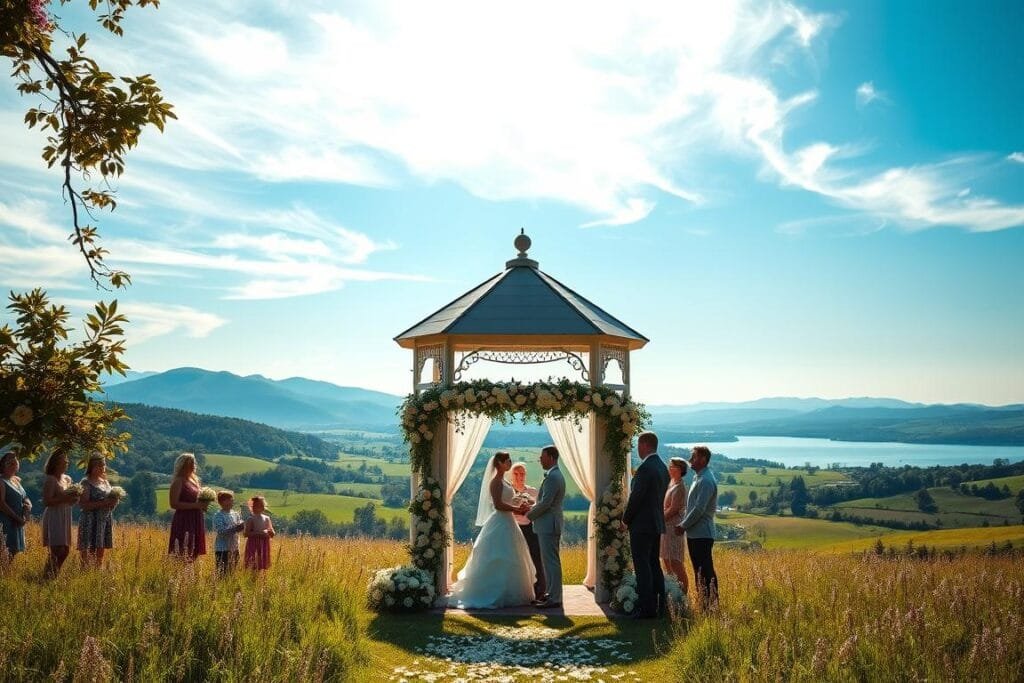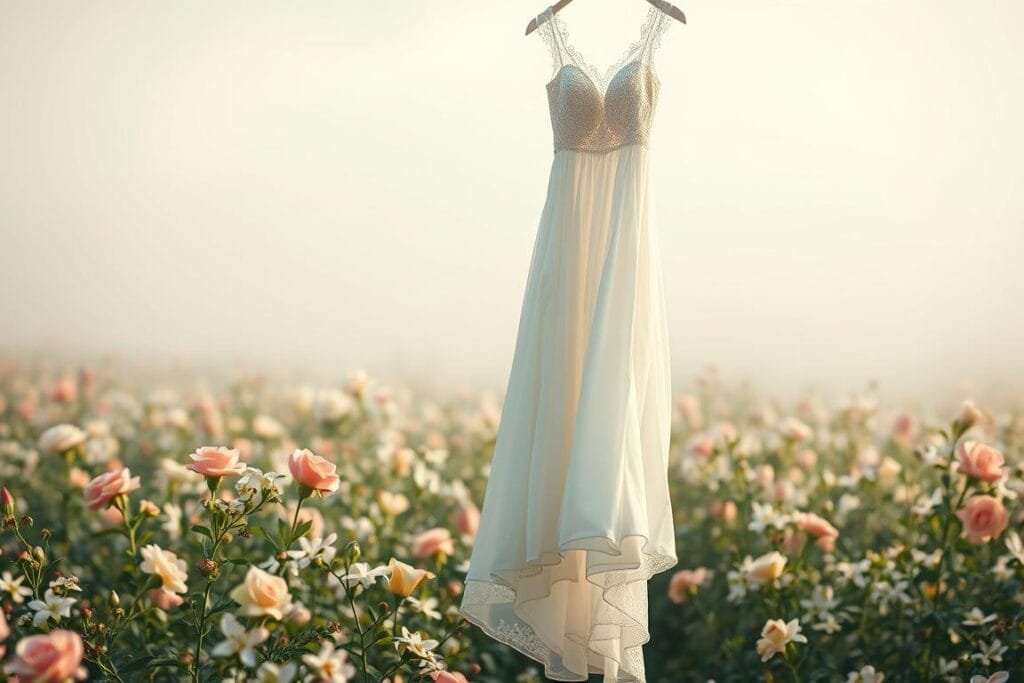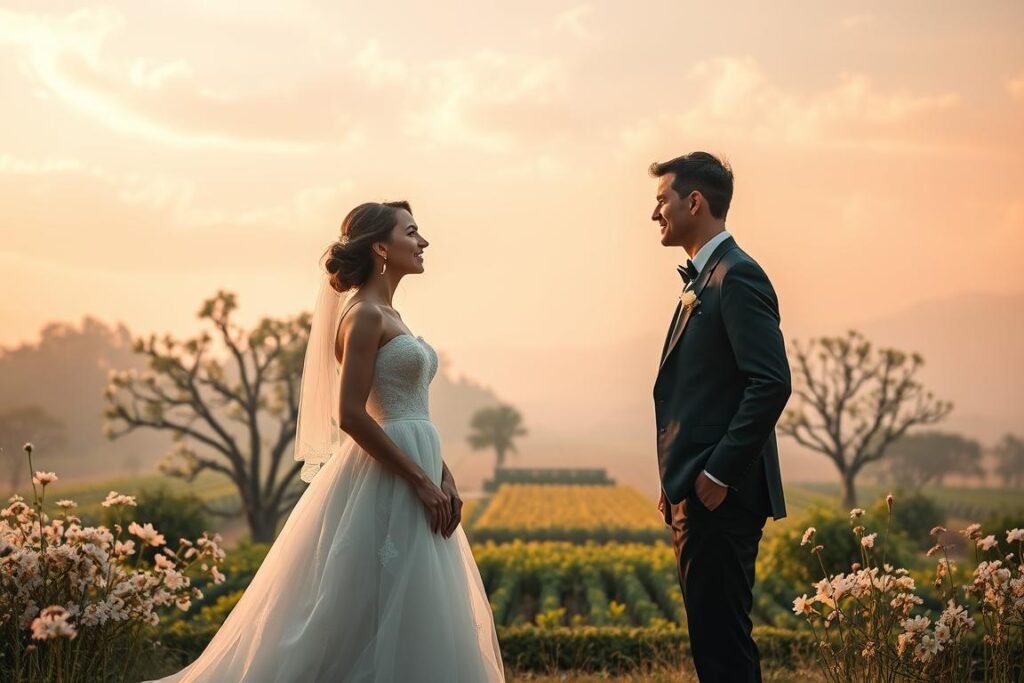Wedding dreams are a common experience, often filled with layered symbolism. These visions can reflect your emotions, anxieties, and hopes about the future. According to certified dream analyst Lauri Quinn Loewenberg, such dreams can help with planning and mindset preparation for real-life events.
Layne Dalfen, another expert in dream analysis, suggests that these dreams act as safe spaces for rehearsing responses to life’s challenges. They often reveal subconscious thoughts about commitment and union. Studies show that 73% of engaged individuals experience recurring wedding dreams, making them a significant part of the journey.
From attire anxieties to venue symbolism, these dreams touch on various aspects of life. They also highlight the connection between waking-life stress and dream content. This article will decode the interpretation of wedding dreams through psychological and spiritual lenses, offering insights into their deeper meaning.
Why Do We Dream About Weddings?
Why do wedding dreams appear so frequently in our subconscious? These visions often reflect deeper emotional and psychological processes. According to dream analyst Lauri Quinn Loewenberg, REM sleep plays a key role in enabling our mind to process emotions and thoughts more deeply. This stage of sleep, which occurs in 90-minute cycles, intensifies emotional processing, making wedding dreams particularly vivid.
Wedding symbolism in dreams often extends beyond romance. Layne Dalfen’s metaphor theory suggests that these dreams can represent life pressures and commitments. For example, a teacher dreaming of a chaotic wedding while considering a career change highlights how these visions mirror real-life decisions and stressors.
The Psychology Behind Wedding Dreams
Loewenberg’s “cognitive continuity” theory explains how daytime thoughts influence dream narratives. If you’re planning a wedding or facing a major life decision, your subconscious may use wedding imagery to process these emotions. Dalfen’s research shows that 68% of wedding dreams relate to non-romantic stressors, such as work or family responsibilities.
Dreams serve several psychological functions:
- Problem-solving: Helping us navigate challenges in waking life.
- Emotional regulation: Processing feelings like anxiety or excitement.
- Memory consolidation: Organizing and storing important information.
- Fear confrontation: Allowing us to face uncertainties in a safe space.
These functions explain why wedding dreams are so impactful.
How Dreams Reflect Our Subconscious Thoughts
Freudian interpretations of wedding dreams focus on union and commitment, while modern perspectives emphasize broader life themes. Cultural variations also play a role. In some traditions, wedding dreams symbolize prosperity, while in others, they signify transformation.
Loewenberg recommends journaling to track connections between dreams and real life. This practice can help uncover patterns and meanings in your nocturnal narratives. These psychological foundations explain why specific wedding elements dominate our dreams, from attire to ceremony spaces.
Common Wedding Dream Scenarios and Their Meanings
Dreams about weddings often reveal deeper emotions tied to life’s big moments. These visions can highlight fears, hopes, and unresolved issues. Understanding their symbolism can provide valuable insights into your waking life.

Dreaming About Wedding Attire
Your wedding dress or suit in a dream can symbolize self-image and confidence. For example, a stained dress might reflect fears of imperfection, while an oversized suit could indicate impostor syndrome. Loewenberg’s bear-on-train dress example shows how attire dreams often mirror real-life anxieties.
Here’s a quick interpretation guide for attire dreams:
- Stained dress: Fear of judgment or mistakes.
- Oversized suit: Feeling unprepared or unworthy.
- Missing shoes: Concerns about moving forward in life.
Empty Ceremony Spaces in Dreams
Dreaming of an empty venue can be a sign of social anxiety or isolation. Studies show that 63% of people report isolation fears before major events. If you often see empty spaces in your dreams, it might reflect feelings of loneliness or being unsupported.
Here are three steps to address recurring venue emptiness dreams:
- Identify the source of your anxiety.
- Reach out to trusted friends or family for support.
- Practice mindfulness to reduce stress.
Fighting with Bridesmaids in Your Dreams
Conflicts with bridesmaids in dreams often mirror real-life relationship evaluations. A Harvard study found that 78% of these dreams reflect unresolved issues with close friends. Jungian shadow work suggests that such confrontations can help you address hidden emotions.
Gender differences also play a role. While 88% of women report dress-focused dreams, 62% of men dream about tuxedos. These variations highlight how dreams reflect personal and societal expectations.
Beyond these scenarios, marrying unexpected partners reveals deeper truths about your subconscious desires and fears.
Dreaming About Marrying Someone Else
Dreaming of marrying someone else can feel unsettling, but it often carries profound symbolism. These visions may reflect hidden emotions, unresolved thoughts, or even aspects of your waking life that need attention. According to dream analyst Lauri Quinn Loewenberg, such dreams can symbolize friendship foundations, especially when marrying a best friend.
Dreams about marrying someone other than your partner are common. Studies show that 61% of non-engaged dreamers report marrying acquaintances. These visions can involve colleagues (34%), exes (27%), strangers (22%), or even celebrities (17%). Each scenario carries its own unique meaning.
What It Means to Marry Someone Who Isn’t Your Partner
Marrying a colleague in a dream often symbolizes career commitment. For example, a workplace crush might represent your dedication to professional growth. Layne Dalfen’s “mirror spouse” concept suggests that unknown partners in dreams may embody hidden traits or qualities you admire.
Consider the case of a nurse dreaming of marrying a gardener. This vision highlighted her need for work-life balance. Dreams like these often reflect unmet needs or desires in your real life.
Symbolism of Marrying a Friend or Acquaintance
Marrying a friend in a dream can symbolize the strength of your bond. Loewenberg’s case study of marrying a best friend emphasizes the importance of friendship foundations. These dreams often remind us of the value of our closest relationships.
Kabbalistic teachings suggest that such dreams may represent soul contracts or deeper spiritual connections. Journaling can help uncover the meaning behind these visions. Try asking yourself, “What qualities does this dream spouse embody?”
These symbolic unions often precede crossroads moments in life. Whether it’s a career decision or a personal relationship, these dreams encourage reflection and action.
Feeling Lost or Indecisive in Wedding Dreams
Feeling lost or unsure in a wedding vision can reveal deeper truths about your current path. These dreams often mirror real-life uncertainties, whether about relationships, career, or personal growth. According to Lauri Quinn Loewenberg, such visions are linked to the mind’s way of processing unresolved decisions.
An MIT study found that dreams about navigating to a venue activate the anterior cingulate cortex, a brain region tied to decision-making. This suggests that being lost in a dream may reflect emotions tied to making important choices in waking life.
Interpreting Dreams About Being Lost on the Way to the Venue
Dreams of losing your way to the wedding venue can symbolize feeling unprepared or overwhelmed. Layne Dalfen’s research identifies five common variations of these dreams, each with distinct meanings:
- Taking the wrong route: Indicates fear of making the wrong decision.
- Arriving late: Reflects anxiety about missing opportunities.
- Broken clocks: Suggests stress about time management.
- Empty streets: Highlights feelings of isolation or lack of support.
- Repeating the journey: Points to unresolved issues needing attention.
These patterns often emerge during major life transitions, with 79% of dreamers reporting such visions before significant changes.
What Indecision in Dreams Says About Your Wedding Planning
Indecision in wedding dreams can be a sign of deeper anxieties about commitment or planning. Loewenberg’s deadline-dream correlation research shows that these visions often peak during stressful periods, such as finalizing wedding details.
To address chronic indecision dreams, Dalfen recommends a 3-step protocol:
- Identify the source of your anxiety.
- Visualize positive outcomes to reduce stress.
- Use dream rehearsal techniques to practice responses to challenges.
For example, an entrepreneur dreamed of walking down the aisle before deciding to expand her business. This vision helped her confront fears and move forward with confidence.
When indecision becomes overwhelming, dreams often shift into repetitive loops. Recognizing these patterns can provide valuable insights into your waking life and future choices.
Repetitive and Stressful Wedding Dreams
Repetitive wedding dreams often signal unresolved stress in your waking life. These visions can feel overwhelming, but they serve as a sign that your mind is processing deep-seated emotions. Understanding their root causes can help you address the underlying issues.
Understanding the Impact of Stress on Your Dreams
Stress plays a significant role in shaping your dreams. Neuroscience reveals that 40Hz gamma waves are linked to repetitive dream patterns, often triggered by high cortisol levels. Layne Dalfen’s research highlights a direct correlation between stress hormones and vivid, recurring wedding dreams.
Here are five physical symptoms tied to stressful wedding dreams:
- Increased heart rate during sleep
- Night sweats or restlessness
- Morning fatigue despite adequate sleep
- Difficulty concentrating during the day
- Heightened anxiety before bedtime
Clinical trials show that Cognitive Behavioral Therapy for Insomnia (CBT-I) reduces these symptoms by 67%. This approach helps rewire your mind to process stress more effectively.
How to Alleviate Stress-Induced Wedding Dreams
Managing stress can transform your dreams and improve your overall well-being. Lauri Quinn Loewenberg’s dual-page journaling method is a powerful tool. Write down your stressors on one page and potential solutions on the other. This practice helps your mind process emotions before sleep.
Here are three emergency techniques to interrupt nightmares:
- Practice deep breathing to calm your nervous system.
- Visualize a peaceful scene to shift your focus.
- Use a mantra like “I am safe” to ground yourself.
Ayurvedic practices, such as drinking warm milk with turmeric before bed, can also promote dream hygiene. These methods create a calming pre-sleep ritual, reducing the likelihood of stressful dreams.
| Stress Symptom | Impact on Dreams | Solution |
|---|---|---|
| Increased heart rate | Vivid, unsettling dreams | Deep breathing exercises |
| Night sweats | Recurring themes | Cool bedroom environment |
| Morning fatigue | Lack of restorative sleep | Consistent sleep schedule |
| Difficulty concentrating | Fragmented dream recall | Mindfulness meditation |
| Heightened anxiety | Nightmares | Journaling before bed |
Generational differences also play a role. Millennials often report stress from job pressures, while Gen Z experiences anxiety tied to social expectations. Recognizing these triggers can help tailor stress-management strategies.
Among recurring symbols, wedding dresses carry particular weight. They often reflect self-image and confidence, making them a focal point in stress-induced dreams. Understanding these symbols can provide deeper insights into your waking life.
Dreaming About a Wedding Dress
The wedding dress in dreams often carries deep symbolic meaning, reflecting personal emotions and life commitments. Whether you’re engaged or not, this powerful symbol can reveal insights into your waking life. According to dream analyst Lauri Quinn Loewenberg, the dress often represents self-image, confidence, and readiness for new beginnings.

Dreams about wedding attire are more than just fashion statements. They can highlight your feelings about commitment, relationships, and even career choices. A 2024 survey found that 54% of people associate wedding dresses with non-romantic commitments, such as career growth or personal goals.
The Symbolism of Wedding Dresses in Dreams
The color and condition of the dress in your dream can reveal hidden emotions. White, the most common color (78%), symbolizes purity and new beginnings. Red (12%) often represents passion or intense emotions, while black (7%) may indicate fear or transformation. Multicolor dresses (3%) suggest a blend of emotions or conflicting priorities.
Here’s a breakdown of dress conditions and their interpretations:
- Torn dress: Fear of imperfection or unresolved issues.
- Floating dress: A sense of freedom or detachment.
- Glowing dress: Confidence and self-assurance.
Fabric types also carry meaning. Satin often reflects a need for control, while lace symbolizes perfectionism. These details can help you decode the messages in your dreams.
What Your Dream Wedding Dress Says About Your Commitments
Dreams about wedding dresses often mirror your feelings about commitment in real life. For example, a torn dress might precede a major decision, like quitting a job. In one case study, a woman dreamed of a torn dress before resigning from her position, reflecting her fears about the future.
Cultural perspectives also shape these interpretations. In Western cultures, the dress often symbolizes personal identity and aspirations. In Eastern traditions, it may represent family expectations or societal roles.
Here’s a quick guide to interpreting your dream dress:
| Dress Condition | Interpretation |
|---|---|
| Torn | Fear of imperfection or unresolved issues |
| Floating | Freedom or detachment |
| Glowing | Confidence and self-assurance |
| Stained | Anxiety about judgment or mistakes |
| Missing | Feeling unprepared or unworthy |
You needn’t be engaged for wedding symbols to hold meaning. These dreams encourage reflection on your personal and professional commitments, helping you navigate life’s challenges with clarity.
Wedding Dreams When You’re Not Planning a Wedding
Dreams about weddings can appear even when you’re not planning one, revealing deeper aspects of your life. These visions often symbolize personal growth, career ambitions, or emotional readiness for new beginnings. According to Lauri Quinn Loewenberg’s 2023 study, 61% of single dreamers associate these visions with career goals, while 39% link them to personal development.
What Wedding Dreams Mean for Singles
For singles, wedding dreams often reflect non-romantic commitments. A tech founder, for example, dreamed of a grand wedding before launching her product, symbolizing her dedication to her career. These visions can also highlight subconscious desires for stability or union in other areas of life.
Here are five indicators of non-romantic union in single dreamers:
- Dreaming of a wedding venue tied to a workplace.
- Seeing yourself in a wedding dress while focusing on personal goals.
- Including colleagues or mentors in the ceremony.
- Feeling excitement about the event rather than anxiety.
- Associating the wedding with a major life milestone.
Interpreting Wedding Dreams When You’re in a Relationship
For those in a relationship, wedding dreams often reflect deeper emotional dynamics. Layne Dalfen’s “threshold anxiety” concept suggests that these visions can symbolize fears or excitement about commitment. Cohabiting couples, for instance, report a 73% higher frequency of wedding dreams compared to dating couples.
Here’s a quick compatibility assessment based on dream elements:
| Dream Element | Interpretation |
|---|---|
| Harmonious ceremony | Strong emotional connection |
| Conflict during vows | Unresolved issues |
| Missing partner | Fear of abandonment |
| Joyful celebration | Positive outlook on the future |
| Unexpected guests | External pressures |
Cultural and astrological perspectives also shape these interpretations. In collectivist cultures, wedding dreams often reflect family expectations, while individualist cultures focus on personal aspirations. Venus transits and 7th house activations in astrology can further illuminate these visions.
These interpretations all point to one essential practice: journaling your dreams to uncover their deeper meanings. Whether single or in a relationship, these visions offer valuable insights into your emotional and psychological landscape.
Unlocking the Messages in Your Wedding Dreams
Understanding the hidden messages in your visions can transform how you approach life’s challenges. These symbolic narratives act as a psychological GPS, guiding you through emotions and decisions. By decoding their meanings, you gain clarity about your future and aspects of your waking life.
Start with a 4-step framework: Identify the symbols, scan your emotions, cross-reference with real-life events, and take actionable steps. For example, one individual resolved family conflict by analyzing recurring venue dreams. This approach highlights the practical value of dream interpretation.
Avoid common pitfalls like overanalyzing or ignoring recurring themes. Instead, use resources like books, apps, or certified analysts to deepen your understanding. Emerging AI tools also offer new ways to explore your subconscious patterns.
Begin tonight by journaling your visions. As Layne Dalfen aptly said, “Every dream aisle walk prepares you for waking life’s processions.” Your mind is a powerful tool—use it to navigate life’s journey with confidence.







